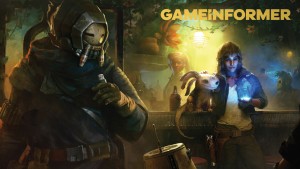Please support Game Informer. Print magazine subscriptions are less than $2 per issue
Minimalism Done Right

Some of the most memorable titles in gaming are the ones developers strip down to the core. Even with simplistic control schemes and less emphasis on polygon counts, minimalistic games provide the type of experience that stick with you long after you put down the controller. Here are a few titles that master all that is minimalism.

Limbo
A young boy embarks on a short quest in search of his sister through a hazardous monochromatic world that leaves the players with more questions than answers. Playdead’s indie platformer takes a minimalistic approach with a simple control scheme, though the real challenge is the trial and error of avoiding gruesome deaths via multiple means of impalement. Limbo cranks up the creepy, instilling a fear of the unseen with noir style visuals leaving players in the dark. Lack of a formal soundtrack and mysterious ambient sounds further add to the tension. Though only a four-hour experience, most people would argue Limbo and its open-ended finale was just enough to resonate with them long after it was over.

Ico
Team Ico’s first creation is a prime example of minimalism done right. Easy to pick up and play, players take the role of a mysterious adolescent boy with horns as he guides a young girl across a world inhabited by shadows. Creator Fumito Ueda and Team Ico used a “subtracting design” approach to reduce gameplay elements to make way for the game’s setting and relationship development for maximum immersion. Gameplay focused on escaping a castle, enemies were simplified to shadows, the interface is clear of a HUD, dialogue was minimal, and the game concluded with a vague ending. Though not a commercial success upon release, we’re thrilled that Ico will make its return alongside spiritual successor Shadow of the Colossus in an HD reboot next year.
![]()
PixelJunk Eden
As the third game in the PixelJunk series, Q-Games released PixelJunk Eden, a visually impressive downloadable title on PSN that offers simple mechanics and minimalist house and techno music. With a focus on physics, players control a Grimp (taken from the words “grip” and “jump”) that must hop and swing its way across various plant life to activate seeds in order to progress. The combination of simple gameplay mechanics, striking visuals, and hypnotizing soundtrack make for a unique and peaceful experience.

Flower
In Flower, another PSN title involving plant life, thatgamecompany brings us a gaming experience unlike anything we’ve ever seen. Flower is a game that features no text or dialogue, but still carries on a light narrative through visual cues, striking emotion in a player by plucking away elements you would find in standard gameplay. Players bring color to a concrete jungle while navigating through dreams of individual potted plants on a windowsill. In these dream sequences, players control the wind and a stray flower petal with a few tilts of the PS3 controller causing dormant flowers to bloom along the way. Wind chime sounds harmonize with light music that dynamically changes along with the world. There’s no game over or time limits, just you engrossed in a sea of flower petals as you gradually make the world a better place.

Pac-Man
Chomping pellets while being chased by colorful ghosts will never get old. Speeding Pac-Man around grids and darting toward power pellets to fend off the opposition for more than 200 levels (not that anyone ever gets that far) is intense and entertaining all the same. This is a timeless concept that makes every playthrough as entertaining as the first.
 Passage
Passage
A programmer named Jason Rohrer created a pixelated computer game that is roughly five minutes in length, but had enough of an impact to make grown men cry. In this memento mori game, players experience life from early adulthood through old age and death that offer a few choices along the way. I could spoil the whole thing here if you have yet to play it, but it’s well worth taking a few minutes to try out for free. Then be sure to read the developer notes. It’s not every day that such a brief experience will cause you to think about the intricacies of life, but Rohrer’s project succeeded in doing so.
Continue on to Page 2.

N+
What started off as a popular Flash game eventually spawned onto XBLA and handheld systems. Controls simply use three buttons to maneuver a stick-figure ninja as it jumps, dodges, climbs, and bounces off walls to progress to each level’s exit. Projectiles can harm the player, however, infinite lives can offset some of the stress of avoiding hazards. Levels are largely grayscale featuring geometrical shapes with very little detail, though with minimal visual distractions, emphasis is placed on determining the most efficient way to reach your goal.

Geometry Wars
Geometry Wars first hit the scene as an easter egg hidden in Project Gotham Racing 2. As buzz built around the popular minigame, Geometry Wars eventually earned itself a standalone title. The concept is simple: Survive as long as you can among a growing swarm of enemies. This old school style of gameplay is simple enough to pick up and play with little fuss, and mesmerizing visuals will be sure to keep you under its hypnosis.

Peggle
PopCap’s Pachinko-inspired Peggle requires players to shoot a pre-determined number of balls at a set of colored pegs, aiming to hit the orange pegs scattered among a group of blue ones. As simple as the concept of Peggle is, the game offers a great degree of strategy as you progress through the 50-plus levels that each end with a satisfyingly climactic finish. Colorful backgrounds don’t detract from action that will keep you sucked in for hours on end.

Portal
A silent female protagonist wakes up in a sterile laboratory and is put through a series of mind-bending challenges that require clever use of interspatial portals. Challenges are delivered to the player from an unforgettable voice through well-written dialogue. As there is only one speaking voice, narrative is kept to a minimum, but doesn’t make the experience any less enjoyable. Portal’s excellent learning curve and level design make it easy to spot the steps you’ll need to take to progress. All environmental objects are entirely functional as the design team made the conscious decision to remove any superfluous geometry that didn’t contribute to gameplay. Though only four hours in length, Portal is a key example of how the proper use of minimalism can create an engrossing and unforgettable experience.

Tetris
The ultimate block stacking puzzler struck gold with a simple formula that makes it one of the most addicting games of all time. Rotate an array of falling blocks to create straight lines. Avoid stacking all the blocks past the top of the game screen. That’s it. As anyone can admit, this simple exercise can eat up minutes to hours of your time. It’s that good.
Which other games should be on the minimalist list?










